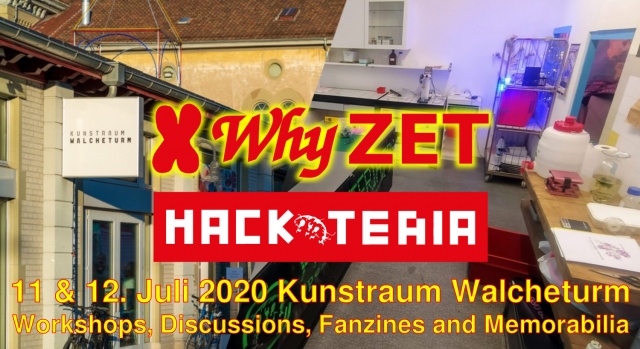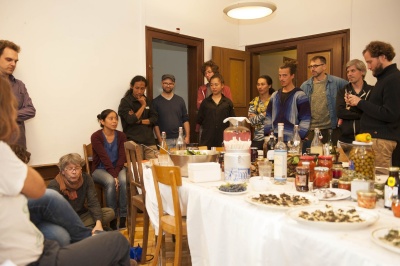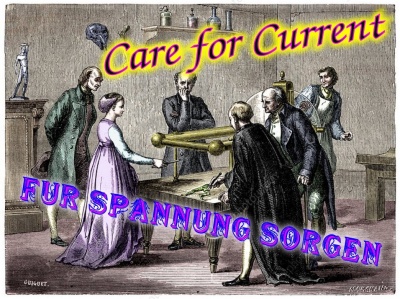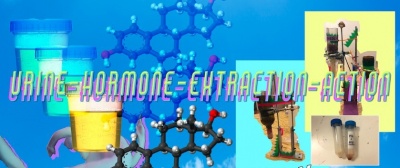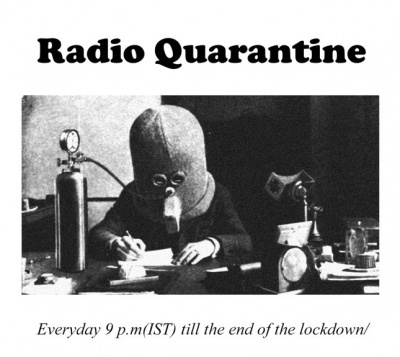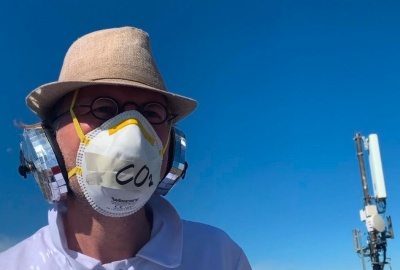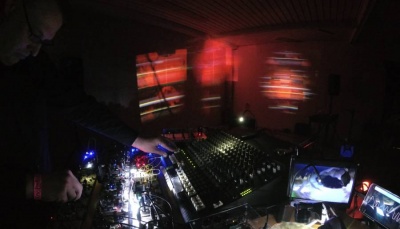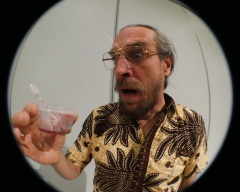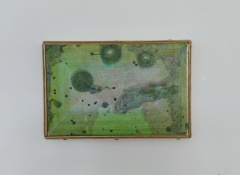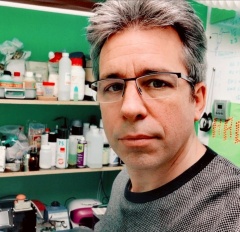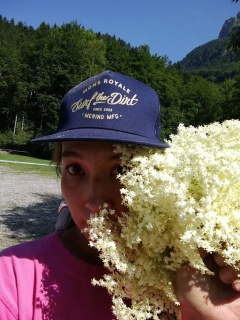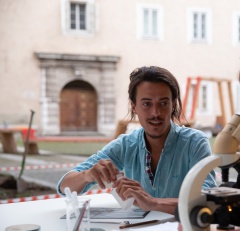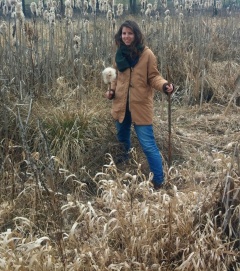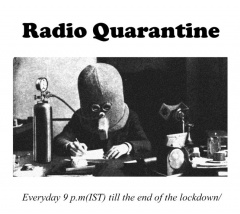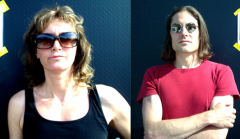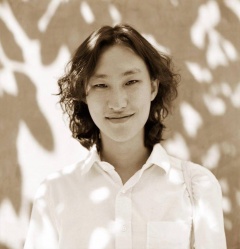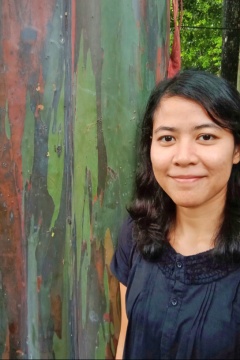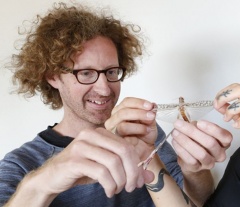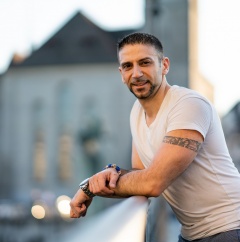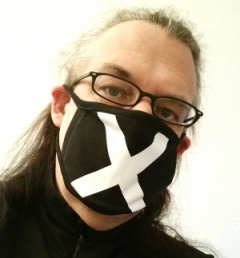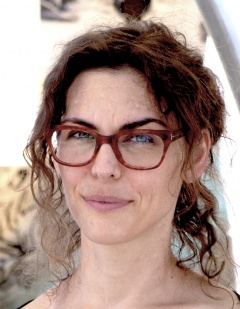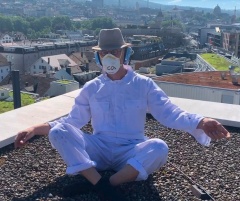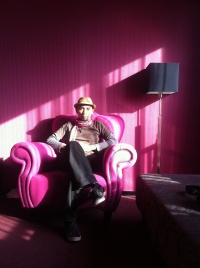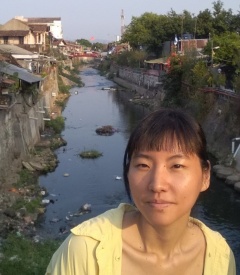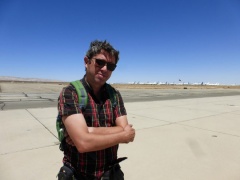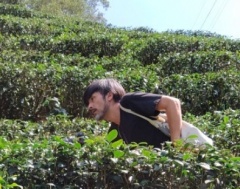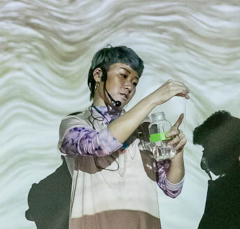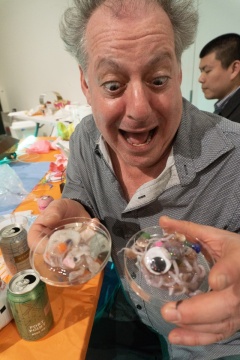HLabX Reflections Zurich
<-- back to HLabX Programme
Contents
- 1 Hackteria X Why ZET
- 1.1 Date: 11. & 12. July 2020
- 1.2 Programme
- 1.3 Memorabilia
- 1.4 Participants
- 1.4.1 Marc Dusseiller aka dusjagr (Switzerland)
- 1.4.2 Dominic Mahnic (Slovenia)
- 1.4.3 Urs Gaudenz / GaudiLabs (Switzerland)
- 1.4.4 Maya Minder (Switzerland)
- 1.4.5 Julian Chollet (Germany)
- 1.4.6 Akvilė Paukštytė (Lithuania)
- 1.4.7 Yashas Shetty / The ISRO (India)
- 1.4.8 Felix Bänteli (Switzerland)
- 1.4.9 Lifepatch (Indonesia)
- 1.4.10 Baggenstos/Rudolf (Switzerland)
- 1.4.11 Shih Wei Chieh aka Abao (Taiwan)
- 1.4.12 Citra Kirana (Indonesia)
- 1.4.13 Roland Fischer (Switzerland)
- 1.4.14 Alessandro Crimi (Switzerland)
- 1.4.15 Wolfgang Spahn (Germany)
- 1.4.16 Corinna Mattner (Switzerland)
- 1.4.17 Kaspar König (Niederlande / Switzerland)
- 1.4.18 Patric Kaufmann aka ASIC (Switzerland)
- 1.4.19 Andreas Siagian aka ucok (Indonesia)
- 1.4.20 BadLab (Global)
- 1.4.21 "Sheri" Shih Hui Chang (Taiwan)
- 1.4.22 Ewen Chardronnet (France)
- 1.4.23 Toru Ryu Oyama (Japan)
- 1.4.24 Mary Maggic (USA/Austria)
- 1.4.25 Adam Zaretzky (United States)
- 1.5 Venue: Kunstraum Walcheturm
Hackteria X Why ZET
Workshops, Discussions, Fanzines and Memorabilia
HLabX was a series of residencies and concentrated gatherings of people working transdisciplinary who are interested in creative biological fields and any other areas which intrigue the critical interaction across art and science. It was held over the last 12 months with activities in Taiwan, Indonesia and Switzerland and culminated this April during Oki Wonder Lab in Okinawa, Japan.
We will bring together our global and local collaborators to reflect on the last decade of activities (X), dream about our collaborative futures (Why) and launch our new local programme "Zentrum für Experimentelle Transdisziplinarität" (ZET) with the innauguration of our new OpenScience Lab in the shared hackerspace collective of Bitwäscherei, in the heart of Zürich.
Date: 11. & 12. July 2020
Programme
Saturday
- 14:00 Open Doors
- 15:00 - 17:00 Workshop: Für Spannung Sorgen <<|>> Care for Current! (Language: German)
- 17:30 - 20:00 Talks followed by Open Discussions
- 20:00 Live Radio Stream from Bangalore and Opening of the Bar
- 21:00 Sound Performances & BioAudioVisual Jam Session
Sunday
- 12:00 Open Brunch and Food Experiments
- 15:00 - 17:00 Workshop: Hormone Extraction Action: Workshop on Biohacking and Gynepunk by Mary Maggic (Language: English)
Workshops
Für Spannung Sorgen <<|>> Care for Current
Samstag 15:00 - 17:00 (Sprache: Deutsch)
Partizipative und geleitete Labor-Session um mit mikro(skopischen) Strom, Spannung und kleinsten elektrischen Phänomenen zu experimentieren. Mit Andreas Rudolf, Felix Bänteli, Wolfgang Spahn und Marc Dusseiller.
Wir bauen eigene Batterien von Grund auf und kaskadieren sie, bis genügend Spannung entsteht. Von zwei, drei Metallen ausgehend versuchen wir mit diesen kleinste elektrische Energien zu erzeugen, die doch genügen um Sound und Licht Effekte zu generieren. Andreas füḧrt euch in seine neuesten Experimente ein.
Strom aus Kristallen? Experimente mit Pulvern aus der Backstube um damit piezo-elektrische Materialien herzustellen die Spannungen erzeugen wenn wir drauf rumhämmern. Felix und Marc werden mit euch ne kleine Kristall-Küche aufbauen!
Elektronische Musikinstrumente die nur mit der Energie der Körperwärme betrieben werden können? Wolfgang zeigt euch seine Neu-Entwicklungen für den Einsatz als “Thermal-Acoustic-Seance”.
Hormone Extraction Action: Workshop on Biohacking and Gynepunk by Mary Maggic (US)
Sonntag 15:00 - 17:00 (Language: English)
How do bodies queer at the molecular level? How is this queering inextricably tied to industrial capitalism? And is there a way out of capitalist ruins, one that has been further exacerbated by the pandemic? Combining body and gender politics and environmental toxicity, this workshop centers on the concept of “open source estrogen,” the underlying premise that hormonal molecules are ubiquitously all around us, and available for us to hack, mutate, and become-with. Through this process of socio-political excavation, we can begin to "emancipate the hormone molecule,” unboxing its molecular mystique. The 2-hour workshop will begin with a talk on hormonal histories and fictions and finish with a hands-on urine hormone extraction protocol. The materials list can be found here for those who wish to follow along<3
Open Source Estrogen#Urine Hormone Extraction Action
Performances
Starting with a live stream from Bangalore and opening of the Bar at 20:00.
Sonified Negronis
Aging a cheap whisky for years within a few hours? All you need is a ultrasonic cleaning device and chips of barrel wood. Sonified Negronis with Roland Fischer
Radio Quarantine (Live from Bangalore, India)
"This is the only radio station that you need during this lockdown."
http://radio.artscienceblr.org/
Kaspar König - Quarantöne
Wolfgang Spahn - Self Similarity
Wolfgang Spahn's unique performance „Self-Similarity“ relates to Madelbrot's ideas by displaying sonification and visualization of fractal systems. Analog computer and analog neural systems communicate with the self-similarity of Patagonia's nature on both huge and macroscopic scale.
BioAudioVisual Jam Session
Dancing waterfleas, wild poly-esters, sonified negronis, sewingmachine motor noises, piezo-everything performance and jam-session. Open to join by all!!
ASIC live
Memorabilia
Participants
Marc Dusseiller aka dusjagr (Switzerland)
Marc Dusseiller aka dusjagr is a nomadic researcher and workshopologist. He is part of the Center for Alternative Coconut Research and co-founder of SGMK and the Global Hackteria Network, Co-organiser of GOSH, Gathering for Open Science Hardware. He loves making DIWO laboratories for creative biological experimentation and works in an integral way, combining science, art and education. He has worked as guest faculty and mentor at various schools, Srishti, Bangalore (IN), UCSB (USA) and in Switzerland, FHNW, HEAD, HSLU, ETHZ. He lives and works in Zürich, Yogyakarta and Taipei. He also loves synthesizers and coconuts.
Dominic Mahnic (Slovenia)
Urs Gaudenz / GaudiLabs (Switzerland)
Urs Gaudenz is an engineer and interdisciplinary scholar working in Lucerne, Switzerland. He was born 1971 in Seattle USA. He got his master in science of Microtechnologoy from the Swiss Federal Institute of Technology, Lausanne. Subsequent to that he attended Post-Graduate programs in international business and innovation-management. In 2016 completed the course of study in the Principles and Applications of Synthetic Biology as directed by Georg Curch, Professor of Genetics at Harward Medical School. He is founder of GaudiLabs, a third space for third culture. He is a founding member and member of the board of Hackteria International Society. He is currently on the faculty of the Lucerne School for Applied Science and Arts. In his professional practice, Urs Gaudenz makes use of various forms of work and expression such as prototype development, open scientific research and collaborative workshops. He is combining his different backgrounds to explore new technological and cultural fields and his works often emerges out of the void in this intersection. Remarkable in his work is the wide span from speculative and futuristic to very functional and applied. He worked with and was inspired by Dr. Marc Dusseiller - dusjagr labs, the Swiss Mechatronic Art Society, the GynePunk, BioDesign for the Real World, Sci | Art NanoLab Summer Institute at UCLA, LifePatch. He was invited to give workshops or exhibit projects at renown institutions and festivals such as Ars Electronica - Projekt Genesis, ISEA - International Symposium on Electronic Art, DOCK18, space for media cultures of the world, Kapelica Gallery / BioTehna, Schloss Werdenberg, N/O/D/E festival, Medialab-Prado Madrid, CYNETART-Festival - Trans-Media-Akademie.
http://www.gaudi.ch/GaudiLabs/
Maya Minder (Switzerland)
Maya Minder‘s (b. 1983, lives in Zürich) Gasthaus combines artistic, curatorial, and activist interests into communal culinary events at various locations. For the Klöntal Triennial, she designed the opening dinner and also offers a series of workshops, including a biohacking workshop and a fermentation workshop, over the course of the Triennial‘s duration. Fermentation repeatedly features as a central aspect of her work, not only literally but also as a metaphor for social ferment, agitation, and incitation to resistance. Minder opposes the structures of food industry by promoting local selforganization, ecological sustainability, and community. She resuscitates traditional food productions methods with a certain relish, saving them from otherwise being forgotten. Her interests span the fields of art, politics, and biohacking, and she often invites other protagonists from these and various other fields to participate in the process of communal exchange. Facilitating interdisciplinary, intercultural dialogue amongst the participants is one of the primary goals of her practice.
Julian Chollet (Germany)
Julian is a (no)mad scientist, curious student and informal teacher with a background in molecular biology. He is working on the endless and underexplored biodiverity of microbes, fungi and phages - with the aim to liberate the world from microphobia through workshopology, fermentation and microscopy. His current main project focuses on creative learning environments and public participation in science with emphasis on the invisible world.
Akvilė Paukštytė (Lithuania)
Akvilė is a freelance 2D designer currently working with museums, exhibitions and installations.
A prominent forest goods gatherer, explorer and observer, Akvilė is seeking to find a medium to combine the two worlds.
Yashas Shetty / The ISRO (India)
(Art)ScienceBLR is a public laboratory at the Srishti Institute of Art, Design and Technology for artists and designers to engage with scientific practices. We look at the artistic, social and political implications of technologies from computing to biotechnologies. Our work exists at the intersection of art-science and pedagogy, creating spaces of dialogue and interaction between artists, designers and scientists. Since our inception in 2009 we have focused on using DIY techniques to build low-cost laboratory equipment, so as to offer more accessible forms of engagement with the life-sciences.We also run a community electronics and BioLab which encourages students and the community to make/hack and prototype.
The Indian Sonic Research Organisation is a collective of instrument builders and artists dedicated to the proliferation of experimental music and sound art. We run a community music lab in Bangalore where we make, perform, teach and collaborate through workshops, performances and artist residencies. Our independent record label disseminates works by Asian composers, sound artists and musicians from India and abroad.
Felix Bänteli (Switzerland)
Lifepatch (Indonesia)
Baggenstos/Rudolf (Switzerland)
Baggenstos/Rudolf work incessantly to discover new aesthetic possibilities of multiple natural and artificial worlds.They turned their studio into a biohacker art lab, where water lentils grow in giant aquariums and mushrooms hang on the walls. Heidy Baggenstos and Andreas Rudolf both achieved a Master in Fine Arts at the Zurich University of Arts in 2015, and they have been working together since 2005.
Hacking is not the first word that comes to mind when one considers the works of Heidy Baggenstos and Andreas Rudolf. Collaboration seems to be a more fitting term, especially in light of the way that the duo’s works tend to attract other collaborators, to expand into groups and to give rise to workshops, performances and collective events. Moreover, the artists are not exactly spending their time on the keyboard and trying to gain access to other computers. Yet, if one understands hacking as breaking into a system – any system of information, from a digital to a mechanical one – and interrupting its regular operations, then Baggenstos & Rudolf are surely hacking their way through the world. http://www.baggenstos-rudolf.ch/
Shih Wei Chieh aka Abao (Taiwan)
Shih Wei Chieh is a media artist based in Taipei. His wearable art, laser performance have been presented by many global events such as CTM Berlin, SXSW, YouFab, Modern Body Festival, University Technology Sydney etc. His work “Laser Dye” project in 2015 combines laser projection and cyanotype photography innovate the digital printing technology for 3D garments, shoes-wear. He’s also the founder of “Tribe Against Machine”, a social engaged project that invites media artist, e-textile artist to work with Taiwan Atayal tribe community, explore the new role of artist in remote society, how technology should evolve by reflecting to the crisis of the world after capital.
Citra Kirana (Indonesia)
Citra Kirana was born in Jakarta, Indonesia. She started to develop her interest in food in 2010 when she worked at one of the largest restaurant chain in her hometown. She realized how food has played significant role in human celebration in all kinds. Since then, she began to observe food as a powerful tool to transform the life of many people with its own unique ways.
From 2013, she has involved in several communities in Jakarta, Yogyakarta and Bali to raise people awareness on food connection through mindful eating. The activities includes cooking class, workshops, discussions, retreats and community market.
Citra is now living in Yogyakarta, expanding her exploration on local food cultures and ingredients. Her recent activities including herb gardening, working on her kitchen, and running a pop-up Bar with her partner.
Roland Fischer (Switzerland)
Alessandro Crimi (Switzerland)
Wolfgang Spahn (Germany)
Wolfgang Spahn is a visual & sound artist based in Berlin. His work includes installations, performances of light & sound and miniature-slide-paintings. His art explores the field of analogue and digital media and focuses on both their contradiction and their correlation. He is faculty member of the Sound Studies and Sonic Arts, Berlin University of the Arts.
Corinna Mattner (Switzerland)
Corinna Mattner is founder of the label Romy Hood within she unites her passion for vintage materials, creative transformation and fighting for a better future. With her background as scenographer and organizer of exhibitions she is one of the main brains behind Fashion Revolution Switzerland an helped the movement become big in Zürich, spreading it over Switzerland. For her collections of unique fashion pieces she uses high quality vintage material and outcasted clothes which she turns around, drapes, cuts apart and reconstructs. Since 2017 she is following a series of hybrid escapes for which she is teaming up with biohackers and performance artist, experimenting with eco and bacteria print and performs musical sewing on stage.
Kaspar König (Niederlande / Switzerland)
Next to lecturing and creating educational open Research and teaching formats (@ ZHdK, HfM Mainz; Leuphana) Kaspar Königs artworks advocate „creating momentum for social and environmental sense“ in the realm of design and soundart. He is based in Zürich and Emmental in Switzerland. His works emmit transitory holism by the means of sound, objects and performance and invites the observer to reflect on the relationships of the local context and the universe. He builds instruments on the spot and works with "instant improvisation" to focus in the here and now.
Together with the friends of the Hackteria network and fellow artist, he was able to realize some online projects too:
Patric Kaufmann aka ASIC (Switzerland)
Andreas Siagian aka ucok (Indonesia)
Andreas Siagian is an artist-engineer working on a wide range of practice in DIY electronics and interdisciplinary art. He studied civil engineering but since 2004, he was actively involved in the electronic music and experimental music scene as organizer and facilitator. In 2008, he started to make installations, developing workshops, and participating in art and science events as well sometimes performing in experimental music events. He co-founded Lifepatch—a citizen initiative in art, science and technology in 2012, where he is still active with the other members in developing workshops, artworks, and participating in and organising public programs. In 2014, he was the co-director of Hackterialab 2014—Yogyakarta, a two week hacklab program of interdisciplinary collaboration organised by Hackteria and Lifepatch.
His solo practice brought his interest in DIY electronics and instrument making to The Instrument Builders Project in 2013 (in Yogyakarta) and 2015 (in the National Gallery of Victoria, Melbourne). He collaborated with Wukir Suryadi to create senjatajahanam, two instruments that were performed in the opening of Jogja Biennale 2015. In 2016, he was the visual artist for Senyawa's solo concert in Jakarta, Indonesia, and in 2018, he was the co-director of Biocamp Tokyo, artistic director of Indonesia Netaudio Festival, co-host of the Hacklab Nusasonic in Yogyakarta and CTM festival in Berlin, also facilitator of Arisan Tenggara. He is now part of the creative board of Cultural Festival Yogyakarta since 2018.
http://andreassiagian.wordpress.com
BadLab (Global)
"Sheri" Shih Hui Chang (Taiwan)
Sheri Shih Hui Chang has been working with creative methodologies to realize the previous unimagined, including using digital modeling and fabrication, molding and casting using bio-materials with textiles and fibers, DIY electronics, and film photography. The bio-inspired parametric fashion collection was selected for the CFDA+2015 Design Graduates and published in the Council of Fashion Designers of America talent book. The work has been exhibited in art spaces and events in the United States and Taiwan. Sheri continues to generate conversations between fields by experimenting with various materials and forms in hybrid fabricating process.
Ewen Chardronnet (France)
Ewen Chardronnet (France) is an author, journalist, curator and investigative artist. Currently acting as curator of the artists-in-residency program at the Roscoff Marine Station (Brittany, France), he has since the early 90s participated in many artistic endeavors and published as an essayist in numerous publications. He has lectured extensively and has served on various boards and committees in the field of art and technology. He is co-founder with the artist group Bureau d’études artist group of The Laboratory Planet journal. Ewen is active in the field of space culture for twenty years. His last publication is a nonfiction narrative book on the secret history of the American space program (Mojave Epiphanie, Inculte, March 2016).
Toru Ryu Oyama (Japan)
Toru (Ryu) Oyama (JPN) is born in Japan, lives and works in Japan, Germany and South Korea. As an artist and a chemical pharmacist, the art works of Ryu Oyama reflect his engagement in biology, chemistry, fields he ventured into while pursuing his degree in pharmacy at University Japan. He has since been developing artworks that draw from his knowledge of biological chemistry and combined visual art. Since 2007 Oyama has studied at the Staatliche Akademie der Bildende Kuenste Karlsruhe and worked in Germany. In 2014 and 2015, he showed projects in a two-part exhibition Adaptation and Blind Spot, at the Karlsruher Institut für Technologie (KIT) Campus Nord.
Mary Maggic (USA/Austria)
Mary Maggic (b. 1991, Los Angeles) is a non-binary artist and proud amateur working within the fuzzy intersections of transfeminist hacking and ecological alienations. They approach the ever-urgent topic of body and gender politics through the perspective of science, knowledge production, and disobedient molecules. Using public workshopology, freak science, performance, documentary, and speculative fiction, Maggic is most known for projects "Open Source Estrogen" and "Estrofem! Lab" that generate DIY protocols for hacking hormones from bodies and environments, demonstrating their micro-performativity and potential for problematizing social constructs of gender. They have exhibited internationally including Migros Museum of Contemporary Art (CH), Philadelphia Museum of Art (US), Science Gallery London (UK), Haus der Kulturen der Welt (DE), Jeu de Paume (FR), MOCA Tuscon (US), Haus der elektronischen Kunst (CH), Institute of Contemporary Arts London (UK), outsight gallery (KR), Spring Workshop (HK), and Art Laboratory Berlin (DE). Their work has been featured in Vice, Makery, Hyperallergic, ArtAsiaPacific, Clot Magazine, and Dazed Digital, and has been awarded the Prix Ars Electronica Honorary Mention in Hybrid Arts (2017) and a Fulbright research scholarship in Yogyakarta, Indonesia (2019).
Adam Zaretzky (United States)
Zaretsky is a Wet-Lab Art Practitioner mixing Ecology, Biotechnology, Non-human Relations, Body Performance and Gastronomy. Zaretsky stages lively, hands-on bioart production labs based on topics such as: foreign species invasion (pure/impure), radical food science (edible/inedible), jazz bioinformatics (code/flesh), tissue culture (undead/semi-alive), transgenic design issues (traits/desires), interactive ethology (person/machine/non-human) and physiology (performance/stress). A former researcher at the MIT department of biology, for the past decade Zaretsky has been teaching an experimental bioart class called VivoArts at: San Francisco State University (SFSU), SymbioticA (UWA), Rensselaer Polytechnic Institute (RPI), University of Leiden’s The Arts and Genomic Centre (TAGC) and with the Waag Society. He has also taught DIY-IGM (Do-It-Yourself Inherited Genetic Modification of the Human Genome) at New York University (NYU) and Carnegie Melon University (CMU). He also runs a public life arts school: VASTAL (The Vivoarts School for Transgenic Aesthetics Ltd.) His art practice focuses on an array of legal, ethical, social and libidinal implications of biotechnological materials and methods with a focus on transgenic humans.
Venue: Kunstraum Walcheturm
Der Kunstraum Walcheturm versteht sich als Ort, wo zeitgenössische Kunst präsentiert, vermittelt und zur Diskussion gestellt wird. Mit seinem Programm, das zeitgenössische Kunst, neue Medien, Video und Film, neue Musik, experimentelle elektronische Musik, Performance und Sound Art umspannt, steht der Walcheturm zwischen Kunsthallen, Galerien und Offspaces. Er bietet nationalen wie internationalen Kunstschaffenden und einem differenzierten Publikum ein anspruchsvolles Experimentierfeld.
Der Kunstraum Walcheturm lotet zeitgenössische Strömungen innerhalb der Schweizer Kunstszene aus und führt Künstler_innen aus der Schweiz mit Künstler_innen aus anderen Ländern zusammen. Dank seiner internationalen Verbindungen zu Kunstinstitutionen, Projekten und Netzwerken ähnlicher Ausrichtung, mit Workshops, Diskussionsveranstaltungen und einem virtuellen Archiv fördert der Walcheturm die wichtige und anspruchsvolle Vermittlung neuer Kunstformen und den Dialog mit der Öffentlichkeit.
Die gut besuchten Veranstaltungen zeigen, dass sich der Walcheturm in den vergangenen Jahren als nicht-kommerzielle Institution erfolgreich positionieren konnte. Gezielt werden Initiativen im Bereich der digitalen Medien vorgestellt und damit Schnittstellen zwischen den verschiedenen Ausdrucksformen gebildet. Hier werden Entwicklungen und Projekte eines erweiterten Kunstbegriffes beleuchtet und präsentiert. Und hier wird der Zugang zu einer lebendigen Kultur geschaffen, die sich in den Grenzzonen des Kunstbetriebs befindet.
